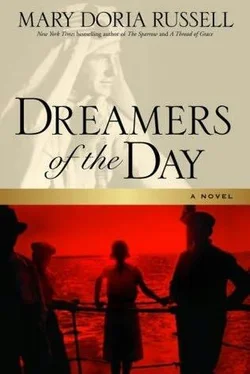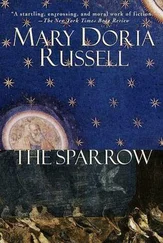The Semiramis, I was given to understand, was one of the finest hotels in the world. Certainly it was one of the most expensive, but by the time I made the reservation, I was long past pinching pennies. I put down a substantial deposit and, having parted with that kind of money, it never occurred to me to ask, “Will Rosie (who you very well know will be traveling with me) also be permitted to stay at the Semiramis?”
After the cool, blue beauty of the Mediterranean, the port of Alexandria greeted our steamer with milky heat and a buzzing horror of flies. Above us, vultures wheeled or seemed to stall, stationary in the sky. Peddlers on the squalid dock hawked sugarcane and dates and lemonade in an aggravating singsong serenade. Beyond them, woeful donkeys complained while being grossly overloaded by sweating stevedores.
An alarming crowd of nearly naked men had gathered, hoping for work, I supposed, but with a sullen temper that certainly would have discouraged me from speaking to any. One stood out, however, handsome in a white turban, his bare brown legs beneath a long blue gown held close by a vivid red belt. Raising a hand to shield his eyes against the glare, he seemed to search the deck. Just as I saw “Cook’s Porter” emblazoned across his chest, he spotted me and called out, “You travel Cook, madams? All right! I am here!”
Courteous and efficient, this gentleman saw to it that my bags and my person were safely and efficiently transferred to the train station, and that I had exchanged ten dollars American for the equivalent in local currency. Rosie was always a good traveler and seemed to know that she should take care of business before we boarded the southbound train. That accomplished, the two of us were ushered into a first-class compartment. It was well appointed if a bit garish, and stifling hot, but provided blessed relief from the flies that covered one like soot outside.
The man from Cook’s stood at the door, looking expectant. I opened my pocketbook and held out a handful of Egyptian coins. “Um … how much is appropriate?”
He delicately selected two piastres, making sure that he did not touch my palm as he did so. “Thank you, madams. My pleasure, madams. Speak well of me to Cook’s, yes?” And with that, he was gone.
“Well, Rosie,” I whispered, “here we are in Egypt! Imagine that!”
I was trying to be thrilled but so far, Egypt had failed to charm, although the porter was quite nice. Maybe it was just too warm to generate any excitement. Rosie was panting and couldn’t be bothered to work up so much as a growl when two gentlemen slid open the compartment door and took their seats across from us. After murmuring courtesies, they flicked on the lights and two small electric fans I had not noticed mounted above the luggage rack.
“Egypt would be materially improved if relocated to a better climate,” the first one remarked in a lovely accent.
“Yes,” his companion agreed amiably. “We seem to have situated all our colonies in the world’s worst geography.”
I smiled and was about to ask if they were British, but they each rattled open their newspapers, making it clear that no conversation was invited.
The train lurched and pulled away slowly, seemingly reluctant to leave the station. That reluctance lingered for no reason I could discover. Rarely topping thirty miles an hour, we creaked slowly through the tan Egyptian landscape, the surface of which was cracked like pound cake baked at too high a temperature. Outside, beyond the dusty window, the high-pitched train whistle barely drew the attention of brown-bodied peasants who stood as unmoving as scarecrows in the scorched fields we traveled through.
“Gracious! Look at that!” I cried, pointing at a building that seemed to float above its foundation, twenty degrees above the horizon in the shimmering air.
The gentlemen barely glanced out the window. “A mir-a-age,” one informed me, drawing the word out, as though speaking to some pitiable dunce.
“First visit?” the other asked, brows raised.
“Yes,” I admitted, and felt as though I’d committed some unpardonable gaffe. They shot small knowing smiles at each other and went back to their reading. Embarrassed that I was not equally blasé, I moved Rosie’s hot little body off my lap, fussing over her a bit to change the subject in my own mind, if not my companions’.
Mirages became routine. Like Rosie, I dozed as the time passed, molasses slow. Eventually we entered the Delta, where the temperature moderated and the landscape changed dramatically. Natives working in the startlingly green countryside looked more energetic and alive. The train picked up speed as well. I thought, At last—we’re getting somewhere! But a few minutes later, we slowed again and stopped.
Up ahead, the track curved and I could see a pair of automobiles waiting. An English army officer’s spectacles flashed in the light. A few minutes later, a native conductor in a red uniform with a gold sash slid open the door of our compartment. “Gentlemen, your motors are waiting,” he announced, and they disappeared down the corridor with him.
I felt stupid, not sure if we had arrived somewhere or not. I might have asked, of course, but I’d already exposed my ignorance once and was unwilling to invite additional scorn. Before I could decide what to do next, the train lurched forward. I sat back, anxious and confused.
Once again the train picked up speed. Cairo came into sight: an immense agglomeration of low, clay-colored cubes and rectangles. Sidetracks appeared, ran parallel, converged. Suddenly, the roadbed was lined by a mob of furious-looking men in white dresses who screamed and chanted something that sounded to me like “Ah-bah sure-shill! Ah-bah sure-shill!” Rocks began to hit the windows. I shrank back into the compartment, clutching at Rosie, who flung herself toward the window, barking and snarling. Then, just as suddenly, the train outran the mob, and a few minutes later we pulled into the darkness of the Cairo station.
The compartment lights went out. The fans stopped. I sat still, dazed in the eerie silence. The conductor reappeared briefly and indicated that I should leave.
I gathered my things and joined the rest of the passengers in the aisle, keeping Rosie tucked up in my arms so she wouldn’t be stepped on. We emerged into a chaos of jostling, shouting, and rushing.
Rosie and I hurried through the crowd toward the baggage car and waited for my belongings to be unloaded. I sat on my steamer trunk, doing my best to appear both fearless and serenely expectant that someone wearing Cook’s livery would arrive. Time passed. Rosie relieved herself nearby. I pretended not to notice. No one from Cook’s appeared, and the platform was all but deserted. Tired and close to tears, I could just hear Mumma say, Well, you got yourself into this, Agnes. Are you just going to sit there like some greenhorn immigrant, fresh off the boat?
I drew myself up and waved to a passing workman two tracks away. We engaged in a brief, shouted conversation, during which he made reassuring Egyptian noises in response to my distressed American ones. With gestures and smiles, he indicated that I should stay where I was, and then he hustled away.
Eventually the workman returned, grinning happily. He was accompanied by a railway porter who spoke some English and was at pains to point out that the chanting had ended and that the mob outside had dispersed. “No worries, madams,” he soothed, while he and the workman heaved my baggage onto a luggage dolly. “No worries atall!”
The two of them leaned forward to push the cart outside, where lines of wagons and taxis waited. Believing I was now to find my own way to the hotel, I reached into my handbag for some coins. The workman accepted one with much gratitude and left. The porter, on the other hand, displayed an expression of such offended sensibilities, you’d have thought I’d asked if I might eat his favorite child.
Читать дальше












